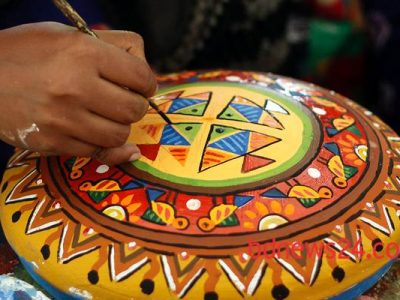Pohela Boishakh | Bangla Noboborsho
Boishakh (বৈশাখ) is the first month of the Bengali Calander and pohela (পহেলা) means first. Bangalies all around the world celebrates the first day of the Bangla calendar as Polela Boishakh or Noborosho. It is a very important day for bangalies because they believe that everything in their life starts fresh again from this day on. They welcome the year by singing-
“ এসো, এসো, এসো হে বৈশাখ
তাপস নিশ্বাস বায়ে মুমূর্ষুরে দাও উড়ায়ে,
বৎসরের আবর্জনা দূর হয়ে যাক
যাক পুরাতন স্মৃতি, যাক ভুলে যাওয়া গীতি,
অশ্রুবাষ্প সুদূরে মিলাক “
As goes-
“O Boishakh, I call on you
Dust away all that’s dying with your ascetic breath
Let the year’s dross go.
Let go old memories, let go forgotten melodies,
Let mists of the eye thin far away into dissolution“
Bangalies all around the world as in Bangladesh, West Bengal, Tripura, Assam, Odisha and other Bengali communities worldwide celebrates this day unitedly irrespective of regional and religious differences. In Bangladesh Pohela boishakh or 14 April is declared as National holiday by Bangla Academy. The festivals and ceremonies held to celebrate the day is noted as Borsho Boron Utshab() or Boishakhi Utshab(). On this specious day, Bangalies from all walks of life comes together and intends to coming year colourful and joyous.
How it started?
Throughout the Mughal regime (1526-1719), property taxes as per the Islamic Hijri calendar were received from the Bengali residents. This calendar was a lunar calendar as it followed the cycle of the moon, and the solar agricultural cycles did not correspond with its New Year. As per some documents, during the reign of Mughal Emperor Akbar, this celebration was a custom launched in Bengal to align the tax year to the harvesting, and the Bangla year was thus called Bangabda. Akbar ordered Royal Astronomer Fathullah Shirazi to develop a new calendar by incorporating the existing Islamic lunar calendar with the Hindu solar calendars. According to a few scholars, it originated the Bengali calendar. According to academic and folklorist Shamsuzzaman Khan from Bangladesh, it may well be Nawab Murshid Quli Khan, a Mughal ruler who first used Punyaho’s custom as “a day for traditional land tax collection” using Akbar’s tax policy to launch the Bangla calendar.

In Bangladesh, in 1966, a committee of Muhammad Shahidullah revised the old Bengali calendar, making the first five months of the year 31 days, each remaining 30 days, and the month of Falgun 31 days during leap year. In 1987, Bangladesh officially recognized this approach. By then, the national calendar starts on 14 April in Bangladesh, the festival of the New Year.
Celebration
On April 14th of every year, a government holiday is being observed by Bangladeshi citizens all over the world, who celebrate Pohela Boishakh.
Chhayanaut’s Program in Ramna Batamul
The festivities begin at Dhaka in the morning with the reinterpretation in the Ramna (the Ramna Batamul) of Rabindranath Tagore’s song “Esho He Bishakh” by Chhayanaut. People from all walks of life gather in the Ramna park to enjoy this refreshing program arranged by Chhayanuat every year. This program starts at dawn with the rising of the sun and tends to continue till 9 am in the morning. Some people have their breakfast with chiramuri, panta vaat while enjoying the cultural program sitting under the open sky with the natural summer breeze. Following the tradition, Chhayanaut’s program ends with the national anthem of Bangladesh with thousands of people standing in silence wishing a better tomorrow for the humanity.

Following the end of the cultural program at Ramna, Mongol shovajatra takes place around 9 to 9.30 am.
Mongol Shovajatra
In Dhaka, a celebration coordinated by faculty and students from Dhaka university’s Faculty of Fine Arts, entitled “Mongol Shobhajatra” takes place with tens of thousands of participants. In 1989 the University Faculty initially initiated the parade, which symbolized harmony and peace, regardless of ethnicity, gender, class or age. The massive, bright, costumes and creatures portrayal is the funniest aspect of the ceremonies! This event was recognized as an immaterial human heritage in 2016 by UNESCO.


Haal Khata
Haal Khata is another Bengali festival celebrated by Pahela Baishakh merchants and shopkeepers by starting a new ledger. On this day merchants close their old books and open a new ledger for the Bangla new year. Customers will settle old debts and get a fresh start. Traders provide sweets, snacks, or gifts to their customers to strengthen the relationship between traders and customers.

Boishakhi Mela
Boishakhi Mela is now gaining prominence in cities across the world and the famous village fair celebrating the Bengali New Year. The young generation always gets an understanding of our history and culture through these fairs, whilst older people get the chance to relive their experiences during their childhood.

Traditional food & Attire
On the occasion of Pohela Boishakh, people from Bangladesh cook and enjoy traditional cuisines. Which include panta bhat (watered rice), ilish bhaji (fried hilsha fish), and many different bharta pastes. There are people wearing festive dresses and women wearing flower crowns on their head. The traditional combinations of white-red colour saree are especially popular during Pohela Boishakh.


In recent years, to celebrate this occasion numerous multicultural institutions and artists are also organizing exhibitions to celebrate Bengali culture throughout the region. Other traditional Pohela Boishakh festivities include bull riding in Munshiganj, wrestling in Chittagong, Nouka Baich (boat racing), cockfighting, pigeon racing.
Pohela Boishakh brings new hope, and gives us the courage to start fresh. The New Year offers a new 365 days of progress, learning and advancement with far more chances of hope and ambition.







